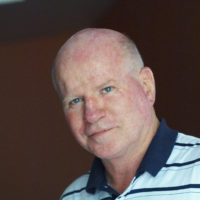Professor Bob Pressey is a Distinguished Professor in the ARC Centre of Excellence for Coral Reef Studies. He leads the Centre’s Program 6: Conservation Planning. Bob’s research team focuses on spatial solutions to diverse resource management problems, involving the design of conservation areas and applications of a variety of conservation actions.
Bob’s students and postdocs work in marine, freshwater and terrestrial environments with study sites spread across and around Australia, through the Coral Triangle and Oceania, and further afield in Mexico, Canada, Brazil, Costa Rica and East Africa. By engaging with local communities, managers and policy makers, the team’s goal is to guide management that promotes the persistence and sustainable use of natural resources.
Bob is widely credited with establishing the important and emerging field of systematic conservation planning and continues to be recognised internationally as one of its leading proponents and innovators. Bob is widely known for the quality, number and impact of his publications. He is an ISI Highly Cited Researcher in Ecology/ Environment, in the top 0.1% of the field. Bob has also led a world-wide shift towards translating the concepts and techniques of systematic conservation planning into actual conservation decisions on the ground.
Research Interests
- Planning for a changing world. Conservation planning that promotes the persistence of natural processes in the context of climate change and shifting human uses of land and sea.
- Integrated land-sea planning. Planning to incorporate ecological connections between land and sea and limit the downstream impacts of cross-system threats.
- The value of information. Understanding and accounting for the limitations of data; rigorous testing of surrogates for biodiversity, costs and social aspects of conservation opportunity; finding the balance between investment in additional information to guide planning and investment in conservation actions.
- People and conservation. Conservation planning incorporating socio-economic factors and livelihood and governance considerations into spatial prioritisation.
- Decision-support systems. Development of innovative and interactive decision-support tools to enable stakeholders to explore different conservation options and prioritise different management actions.
- Linking plans to effective actions. Developing approaches to engaging with agencies, NGOs, statutory authorities and community groups as well as developing an implementation strategy to guide the process of moving between regional designs and local actions.
- Measuring conservation outcomes. Monitoring and evaluating the outcomes of conservation planning and on-ground actions to contribute to policy and adaptive learning.
Selected Publications:
Adams V, Pressey R and Álvarez-Romero J (2016) Using optimal land-use scenarios to assess trade-offs between conservation, development, and social values. PLoS ONE, 11 (6).
Arias A, Pressey R, Jones R, Alvarez-Romero J and Cinner J (2016) Optimizing enforcement and compliance in offshore marine protected areas: a case study from Cocos Island, Costa Rica. Oryx, 50 (1). pp. 18-26
Bode M, Williamson D, Weeks R, Jones G, Almany G, Harrison H, Hopf J and Pressey R (2016) Planning marine reserve networks for both feature representation and demographic persistence using connectivity patterns. PLoS ONE, 11 (5). pp. 1-23
Bridge T, Grech A and Pressey R (2016) Factors influencing incidental representation of previously unknown conservation features in marine protected areas. Conservation Biology, 30 (1). pp. 154-165
Chacón A, Stoeckl N, Jarvis D and Pressey B (2016) Using insights about key factors impacting ‘quality of life’ to inform effective on-farm conservation programs: a case study in Northern Australia. Australasian Journal of Environmental Management, 23 (4). pp. 338-355
Cheok J, Pressey R, Weeks R, Andréfouët S and Moloney J (2016) Sympathy for the devil: detailing the effects of planning-unit size, thematic resolution of reef classes, and socioeconomic costs on spatial priorities for marine conservation. PLoS One, 11 (11). pp. 1-25
Dale A, Vella K, Pressey R, Brodie J, Gooch M, Potts R and Eberhard R (2016) Risk analysis of the governance system affecting outcomes in the Great Barrier Reef. Journal of Environmental Management, 183 (Part 3). pp. 712-721
Fuentes M, Chambers L, Chin A, Dann P, Dobbs K, Marsh H, Poloczanska E, Maison K, Turner M and Pressey R (2016) Adaptive management of marine mega-fauna in a changing climate.Mitigation and Adaptation Strategies for Global Change, 21 (2). pp. 209-224
Grech A, Pressey R and Day J (2016) Coal, cumulative impacts, and the Great Barrier Reef.Conservation Letters, 9 (3). pp. 200-207
Gurney G, Cinner J, Sartin J, Pressey R, Ban N, Marshall N and Prabuning D (2016) Participation in devolved commons management: multiscale socioeconomic factors related to individuals’ participation in community-based management of marine protected areas in Indonesia.Environmental Science & Policy, 61. pp. 212-220
Magris R, Treml E, Pressey R and Weeks R (2016) Integrating multiple species connectivity and habitat quality into conservation planning for coral reefs. Ecography, 39 (7). pp. 649-664
Sheaves M, Coles R, Dale P, Grech A, Pressey R and Waltham N (2016) Enhancing the value and validity of EIA: serious science to protect Australia’s Great Barrier Reef. Conservation Letters, 9 (5). pp. 377-383
Complete list of publications











 Researchers
Researchers Students
Students Alumni
Alumni Management
Management






